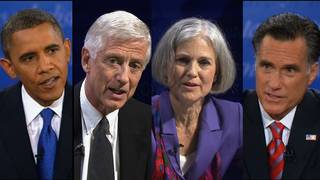
By Amy Goodman with Denis Moynihan
You may have noticed that the Green Party presidential candidate, Dr. Jill Stein, was absent from the “town hall” presidential debate at Hofstra University the other night. That’s because she was shackled to a chair in a nearby New York police facility, along with her running mate, Green Party vice president nominee Cheri Honkala. Their crime: attempting to get to the debate so Stein could participate in it. While Mitt Romney uttered the now-famous line that he was given “whole binders full of women” while seeking staff as newly-elected governor of Massachusetts in 2002, the real binders were handcuffs used to shackle these two women, who are mothers, activists and the Green Party’s presidential ticket for 2012.
I interviewed Stein the day after the debate, after their imprisonment (which ended, not surprisingly, not long after the debate ended). She told me: “We are on the ballot for 85 percent of voters. Americans deserve to know what their choices are. The police said they were only doing job. I said, ‘This is about everyone’s jobs, whether we can afford health care, whether students will be indentured.’ There are critical issues left out of the debate. Ninety million voters are predicted to stay home and vote with their feet that neither Barack Obama nor Mitt Romney represent them. That’s twice as many voters than expected for either of them.”
Even if Stein and Honkala hadn’t been hauled off a public street and handcuffed to those chairs for eight hours, Stein’s exclusion from the debate was certain. The debates are very closely controlled by the Commission on Presidential Debates (CPD), which excludes third-party candidates, among other things. George Farah is the founder and executive director of Open Debates, and author of “No Debate: How the Republican and Democratic Parties Secretly Control the Presidential Debates.” Farah told me on the morning of the Hofstra debate about how the CPD gained control over the debates from the nonpartisan League of Women Voters: “We have a private corporation that was created by the Republican and Democratic parties called the Commission on Presidential Debates. It seized control of the presidential debates precisely because the League was independent, precisely because this women’s organization had the guts to stand up to the candidates that the major parties had nominated.”
The League of Women Voters allowed third-party candidate John B. Anderson to participate in a presidential debate in 1980, and in the decade that followed, the two major parties, Republican and Democrat, sparred with the League. In 1988, the parties tried to force the League into a contract detailing how the debates would be run. Farah explained: “It talked about who could be in the audience and how the format would be structured, but the League found that kind of lack of transparency and that kind of candidate control to be fundamentally outrageous and antithetical to our democratic process. They released the contract and stated they refuse to be an accessory to the hoodwinking of the American people and refuse to implement it.”
Farah said that early contract was “tame” compared with the binding contract, leaked to Time magazine this week, that governed the so-called town hall, moderated by CNN’s Candy Crowley. The 21-page “Memorandum of Understanding” includes a reference to their standards for candidate eligibility to participate. The CPD requires that a candidate have support from “at least 15 percent of the national electorate as determined by five selected national public opinion polling organizations.” This is a classic Catch-22. In order to debate, you must have broad support. In order to earn public support, candidates without huge campaign war chests need the access that the televised debates offer. So the Democrats and Republicans control the debates, and limit the public’s access to alternative views.
If the Green Party’s nominee, Jill Stein, had been allowed to debate, what might the public have heard? To find out, our “Democracy Now!” news hour went ahead and invited major third-party candidates to participate in the debate, virtually, the morning after. In addition to Stein, we had Rocky Anderson of the Justice Party and Virgil Goode of the Constitution Party (Libertarian Party candidate Gary Johnson declined).
Instead of the Obama/Romney debate, where each attempted to trumpet his superior commitment to fossil-fuel extraction, the public would have heard Jill Stein say, “We support a Green New Deal, which will put everyone back to work, at the same time that it puts a halt to climate change and it makes wars for oil obsolete.” Climate change is simply not discussed in these debates.
That’s just one example. Imagine if we had a functional electoral system, with genuine, vigorous, representative debates. Jill Stein and Cheri Honkala are on the ballot in 38 states, and available as write-ins for the rest. Rocky Anderson, with his new Justice Party, is on in 15 states. Now that the candidates have been unshackled, it’s time to unshackle the debates.
Award-winning journalist Amy Goodman is the host of “Democracy Now!,” an independent global news hour that is broadcast on more than 1,100 stations in the United States and around the world. She is a New York Times best-selling author and her latest book is “The Silenced Majority: Stories of Uprisings, Occupations, Resistance, and Hope,” written with Denis Moynihan.
© 2012 Amy Goodman











Media Options